
Collection of media revolving around the Thylacine
149 posts
Latest Posts by moonlight-wolf-archive - Page 5
![Captive Thylacine, C.1920′s. [x]](https://64.media.tumblr.com/d90c4f76a45c41cfb1e149a174bd4e09/tumblr_ojyjfxu2fb1u6w1o1o1_500.jpg)
Captive thylacine, c.1920′s. [x]



just some thylacines




some more images of the thylacine you have probably never seen before

three female thylacine one with a amputation forefoot



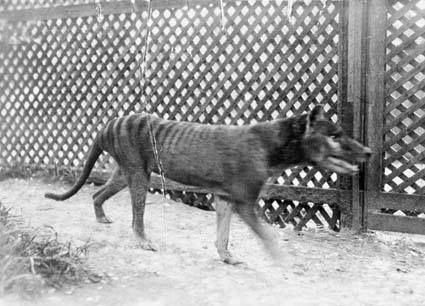

some more thylacines from the london zoo



thylacine from the london zoo



Sunbathing thylacines







images of the thylacine you have probably never seen before
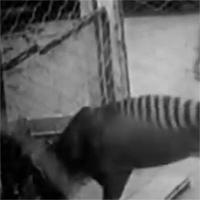








Footage of the last Living Thylacines (Thylacinus cynocephalus) (1936)
“The question is, are we happy to suppose that our grandchildren may never be able to see an elephant except in a picture book?” - Sir David Attenborough

A group of thylacines relaxing in the Hobart Zoo, c. 1920’s.

Tasmanian Tiger Thylacinus cynocephalus Source: Here







some more images of the thylacine you have probably never seen before










some more images of the thylacine you have probably never seen before

I found this interesting high quality zoomed out version of a iconic thylacine photo

ティラキヌス Thylacinus potens
中新世後期に生息したフクロオオカミ属の一種。
The Taronga Zoo in Sydney had a thylacine for a time.
This was the only thylacine ever displayed at this zoo. It’s enclosure was right next to a Puma’s. The puma got a hold of the thylacine’s tail and bit it off.



Newly rediscovered footage of the last captive thylacine (“Benjamin”) as a juvenile at the Beaumaris Zoo has just been released!
The film is 7 seconds long and was taken by Reverend Harold Doyle in 1930 using a hand-cranked camera and nitrate film.
Though it is not as clear as other films, it is still valuable because it gives us more information about the timeline of the last captive and possibly his origin, which have long been disputed.
A looping version of the film can be seen here: https://www.ntnews.com.au/news/newly-discovered-footage-of-the-thylacine/video/9739dac68568a2d9d758c857a1417ae1
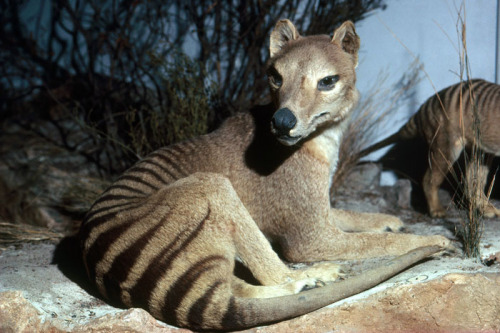
Thylacine taxidermy specimen from the South Australian Museum, formerly displayed as part of a trio.
Currently sitting beside the thylacine in vienna natural history museum and overwhelmed by such a profound sandess.
I've always liked this image bc it really shows the differences between thylacine and wolf skulls

Things to note about thylacine skulls:
-thylacine eye sockets lie "deeper" into the skull
-no stop whatsoever
-8 upper incisors (rather than six), different (pre)molars
-Skull is bottle shaped when viewed from the top




Colourised footage of Benjamin, the last know Tasmanian Tiger (Thylacine).
Benjamin died on September 7th, 1936 in Hobart zoo. It is believed that he died out of neglect, as he was locked out of his shelter and was exposed to the searing hot sun and freezing cold night of Tasmania.
The Thylacine was one of the last large marsupials left on Australia (the other being the Kangaroo) after a great extinction event occurred around 40 thousand years ago. This extinction event, caused mainly by the arrival of humans, wiped out 90% of Australia’s terrestrial vertebrates, including the famous Megafauna.
The Thylacine was around 15-30kg (33-66lbs), were carnivorous, and had numerous similarities to other species like dogs, despite not being related and purely by chance, in a phenomenon known as convergent evolution (just like the ability to fly of bats and birds, despite following different evolutionary paths). Not only that, they could open their jaws up to 120 degrees, could hop around on two legs like a kangaroo, and both males and females had pouches.
Lastly in a cruel twist, the Tasmanian government decided to protect the Thylacine - just 59 days before the last one died, in a very notable case case of “Too little too late”. To date, many biologists believe that there are still Thylacine roaming the wild plains of Australia.
Can I tell you guys how weirdly adorable thylacines are?
Like look at them

Just. Look at them.

Good beans, good False puppers

Adorable dog - tiger - rat - kangaroo bois. Love them, even though they're extinct
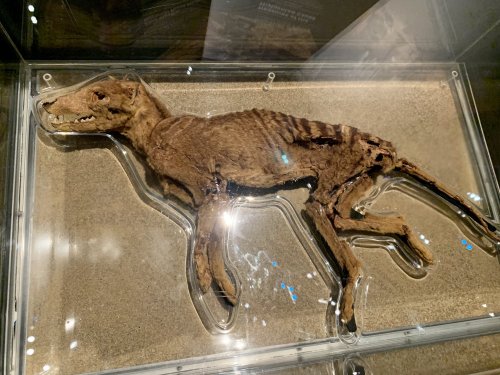
This mummified thylacine was discovered in a cave on the Nullarbor Plain of southern Australia in 1966. It is estimated to be between 4,000-5,000 years old.
The mummy is now displayed in the Western Australian Museum in the same position it was found. Photo via Rob Davis on Twitter.
LOST THYLACINE FOOTAGE REDISCOVERED
Originally shot by Dr. Randle Stewart, an Australian psychiatrist, whilst on honeymoon in Tasmania, these 18 seconds of combined footage show the last captive thylacine in the world.
Commonly referred to as “Benjamin”, the individual lived at the now-abandoned Beaumaris Zoo from the early 1930s to his death in September of 1936, incidentally the same year thylacines were granted official protection by the Australian government.
The footage, shot in 1931, had been considered lost since the late 1970s.
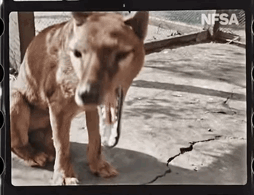
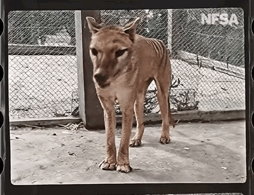

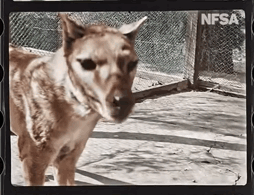
colorized thylacine footage


The tiny skull of a thylacine joey, part of the collection of the Smithsonian National Museum of Natural History. Prior to her premature death, this individual lived alongside her mother and two siblings at the Smithsonian National Zoological Park. [ x ]

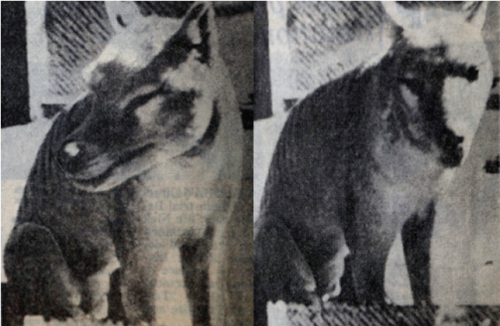
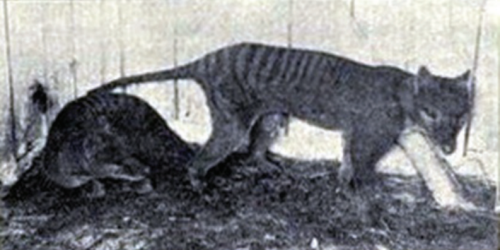
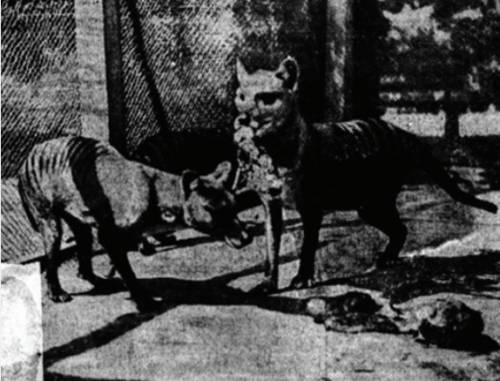
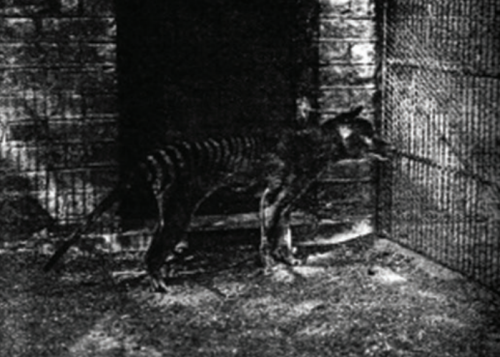
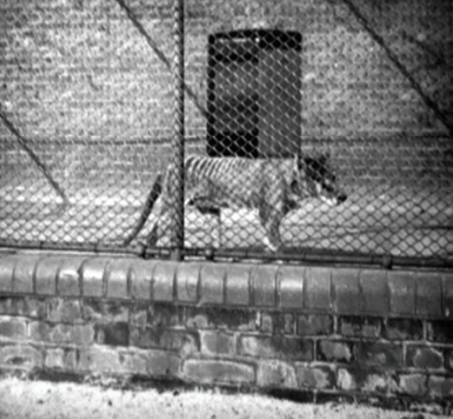


some more images of the thylacine you have probably never seen before
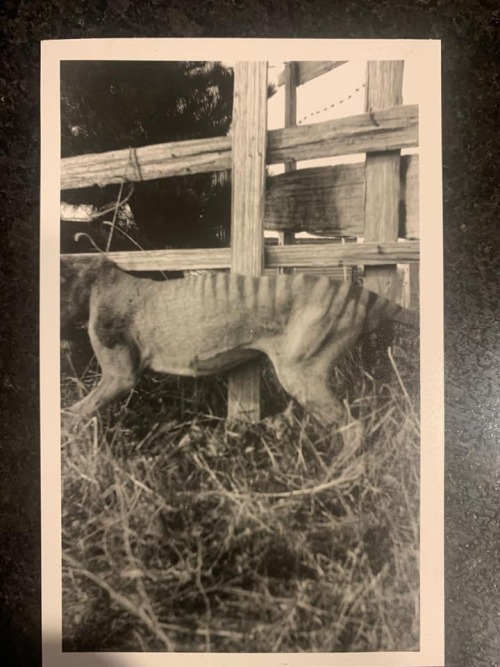
The body of Wilf Batty’s thylacine, stiff with rigor mortis, tied to a fence on the man’s farm. Mr. Batty shot the animal, believed to be a male, in May of 1930, after it had reportedly been going after his chickens. It’s commonly believed that this represents the last thylacine to be killed in the wild. The photo itself, one of just five known to exist of the individual, was uncovered and shared by the great grandson of the original photographer. [ x ]
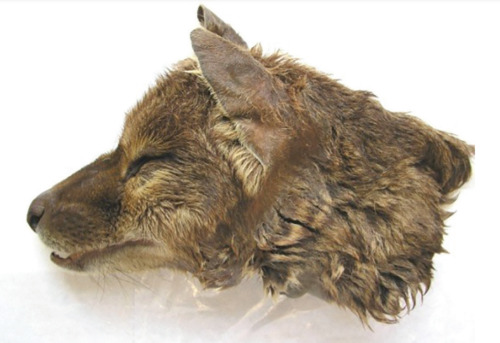
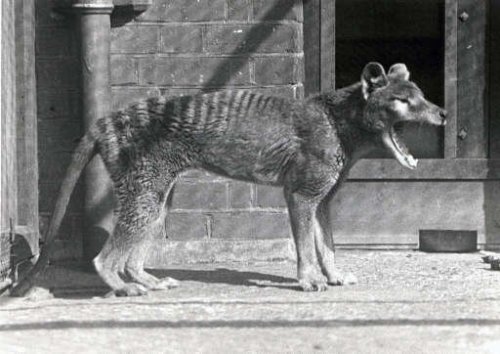
Preserved head of a female thylacine at Oxford University Museum of Natural History and a photo of the same animal when she was alive. This individual was captured in 1925 and sold to Beaumaris Zoo in Hobart, before being transferred to London Zoo in 1926. She died on the 9th of August, 1931. She was the last living thylacine to be exhibited outside of Australia.
Top photo by S. Sleightholme